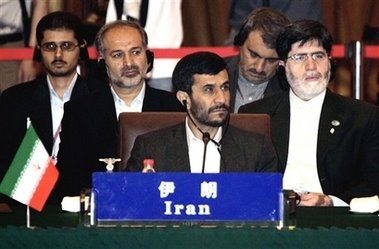Picking up again, I'll review the film I saw last night, David Lynch's newest.
This film is a sequel of sorts to Lynch's last movie, the glorious Mulholland Drive, in that both movies are about the mental breakdown of an actress and the spiritually corrupting powers of Hollywood - or as Lynch says here in Inland Empire's tagline, 'a woman in trouble'. Laura Dern stars, most often as an actress by the name of Nikki Grace, who embarks on an odyssey into a Lynchian nightworld, alongside Lynch regulars Grace Zabriskie, Harry Dean Stanton, Diane Ladd, and Justin Theroux, plus Jeremy Irons, Julia Ormond, Mary Steenburgen, and several Poles (the movie was partially shot in Lodz, Poland) most notably Karolina Gruszka.
It 1986, Roger Ebert panned Blue Velvet primarily because of his reaction to the portrayal Isabella Rossellini's character, which he considered to be misogynistic. There is a sliver of truth of Ebert's criticism in that film, but it has been supplanted by an increasing sense of empathy for the women in Lynch's films ever since; the young women of Twin Peaks and Mulholland Drive, most notably. Here we have what could be called Lynch's City of Women, an array of actresses, housewives, and prostitutes rendered charmingly, sweetly, empathically by Lynch's probing camera. This sense finds its consummation in a cluster of scenes that serve as the emotional heart of the film, when Dern's character (or one of them), poor and beaten-up, explains the hardships of her life to a blank-faced man in a grungy little office. It's an apotheosis of White-Trash cinema, an Oprah confession turned into a scene from a Dreyer film, and Dern knocks it out of the park.
Of course, a Lynch film wouldn't be a Lynch film if it wasn't also funny and weird. The capper in this film occurs when Dern gets stabbed with a screwdriver and staggers through the streets of Hollywood until collapsing next to a chatty cluster of homeless people. The dialogue that ensues ("You dyin', girl.") is classic Lynch, the homeless people talking about bus schedules, broken only when Dern summons the strength to vomit some blood onto the sidewalk. In scenes like this, Lynch brings his nightmares to life.
The most notable break between this film and his previous work is the use of consumer-level DV instead of film. The effect is a tradeoff, losing the typically lustrous cinematography of every previous Lynch film, but gaining a sense of ugly rawness, as if watching a home video of the mind, that suits the film's purpose and its critique of Hollywood facades.
Sunday, December 17, 2006
Saturday, August 05, 2006
Top movies
Since I haven't posted in a while, here's something different: my favorite movies of the year, for each of the last ten years.
1997: TITANIC, directed by James Cameron
1998: THE THIN RED LINE, directed by Terence Malick
1999: MAGNOLIA, directed by Paul Thomas Anderson
2000: ERIN BROCKOVICH, directed by Steven Soderbergh
2001: A.I., directed by Steven Spielberg
2002: THE PIANIST, directed by Roman Polanski
2003: ELEPHANT, directed by Gus Van Sant
2004: VERA DRAKE, directed by Mike Leigh
2005: THE NEW WORLD, directed by Terence Malick
2006 so far: UNITED 93, directed by Paul Greengrass
1997: TITANIC, directed by James Cameron
1998: THE THIN RED LINE, directed by Terence Malick
1999: MAGNOLIA, directed by Paul Thomas Anderson
2000: ERIN BROCKOVICH, directed by Steven Soderbergh
2001: A.I., directed by Steven Spielberg
2002: THE PIANIST, directed by Roman Polanski
2003: ELEPHANT, directed by Gus Van Sant
2004: VERA DRAKE, directed by Mike Leigh
2005: THE NEW WORLD, directed by Terence Malick
2006 so far: UNITED 93, directed by Paul Greengrass
Saturday, July 01, 2006
Superman IV: The Quest for Peace (1987)
I was watching the Superman sequels from the 1980s, before seeing Superman Returns. I noticed that this one stuck out for two reasons. One is a pervasive sense of liberal do-goodery, no doubt Christopher Reeve's influence. After saving some Russians in a space-station accident, Clark Kent heads back to Smallville for some business and this is what he finds:
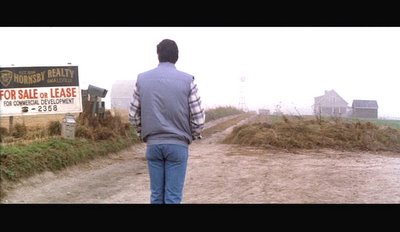
Later he returns to Metropolis, where the Daily Planet has been purchased by a Rupert Murdoch-esque tycoon, who wants to turn it into an exploitative rag, and finally Superman decides to rid the planet of nuclear weapons, a unilateral tactic that is met with no opposition from the armed forces of the United States or the Soviet Union, in the movie's most glaring omission.
The other striking thing about the movie is how it's pretty cheap and clumsy. Here's a shot of Superman on the surface of the moon, and I'm pretty sure those dark lines in the background are the contours of curtains trying to simulate the blackness of space.
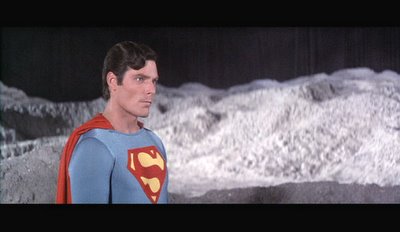

Later he returns to Metropolis, where the Daily Planet has been purchased by a Rupert Murdoch-esque tycoon, who wants to turn it into an exploitative rag, and finally Superman decides to rid the planet of nuclear weapons, a unilateral tactic that is met with no opposition from the armed forces of the United States or the Soviet Union, in the movie's most glaring omission.
The other striking thing about the movie is how it's pretty cheap and clumsy. Here's a shot of Superman on the surface of the moon, and I'm pretty sure those dark lines in the background are the contours of curtains trying to simulate the blackness of space.

Friday, June 16, 2006
Saturday, June 10, 2006
Planet of the Vampires (1965)
Technically the monsters in this movie are space-zombies, but this was before Night of the Living Dead so vampires were more marketable. Mario Bava directed this film, and he's primarily known for his atmospheric visuals. Here are a few examples:
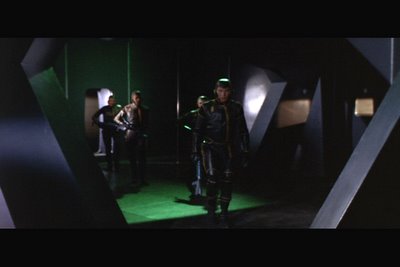
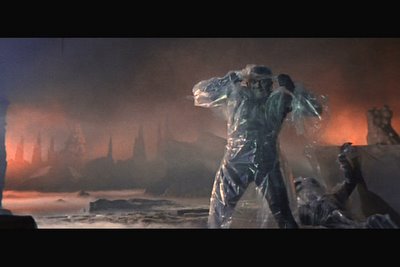
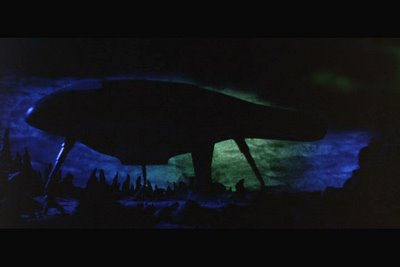
It doesn't have a particularly interesting story or characters, but the mood is wonderfully bleak and oppressive in a stylish Italian kind of way. There's also a nice Lovecraftian scene where two Italionauts are trapped in an ancient alien spacecraft. If aliens with heads this big couldn't get out of their situation, what hope do our guys have?
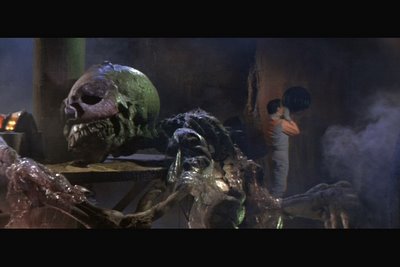



It doesn't have a particularly interesting story or characters, but the mood is wonderfully bleak and oppressive in a stylish Italian kind of way. There's also a nice Lovecraftian scene where two Italionauts are trapped in an ancient alien spacecraft. If aliens with heads this big couldn't get out of their situation, what hope do our guys have?

Friday, June 09, 2006
Four films by David Lean

I recently viewed four films by the guy who's probably considered the greatest British filmmaker after Hitchcock: Blithe Spirit (1945), Brief Encounter (1945), Lawrence of Arabia (1962), and Doctor Zhivago (1965).
The first two are small-scale, fairly intimate productions based on Noel Coward plays. Blithe Spirit is amusing, but a little too droll for my tastes. It's interesting to note that one of the most popular productions in London at the height of World War II was this quick-witted comedy in which the afterlife is just another place to fling witticisms and try to avoid your wife.
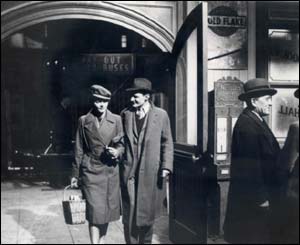
Brief Encounter is much better, and much more heartfelt. You really get a sense of what it was like to live in England at this time, shopping, going to the cinema, smoking, and living lives of quiet desperation. It reminds me a lot of the contemporaneous American The Best Years of Our Lives. Really strong filmmaking too, with narrative and visual flourishes and control far above the very stagy Blithe Spirit.

Lawrence, of course, everybody's seen, but it was nice to see in a 70mm print at LACMA. I last saw this movie in 2000, and the movie's so big I had forgotten a lot of its details. The first half is much stronger than the second, with a powerful narrative drive and almost all of the visuals that one remembers afterwards. The second half rather peters out, but it does seem to come full circle with the beginning of the movie and Lawrence's death by motorcycle. Also, I was struck by how ambivalent Lean seems to feel about British military authority and diplomatic maneuvering; he doesn't seem to agree that British imperialism in the Middle East was a completely good thing.
Doctor Zhivago is the most uneven and deeply flawed of the four movies, but has its share of great moments. This time the first hour is a tough, exposition-ridden slog to get through and the good stuff doesn't start until the war and Revolution come. Omar Sharif's Yuri Zhivago is kind of passive and uninteresting, but fortunately you can always look at Julie Christie when you get bored:
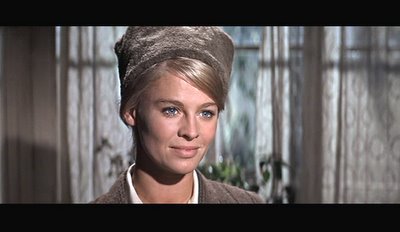
Another movie with an interesting political subtext, as the Russian Revolution is viewed with horror, to be sure, but the movie's happy ending is tied in with the triumphs of the workers: specifically, a big powerful hydroelectric dam.
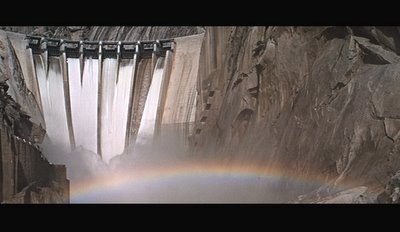
Also, that rainbow's not the only thing Spielberg stole from this movie to put into E.T.:
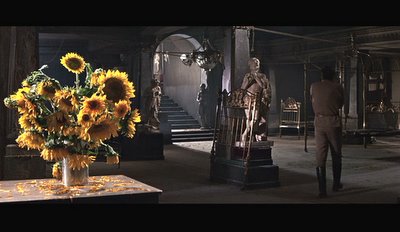
Ginger Snaps (2000)
Pretty good little Canadian horror movie, although I am a little troubled by other critics calling it a 'feminist' horror movie. This seems problematic to me. Granted, it's a horror movie focussing on the issues faced by teenage girls in the midst of puberty, and uses werewolf themes and imagery to deal with mood shifts, physical and emotional changes, social estrangement, etc. But it's also a movie where the 'monstrous other' of the narrative is the mature, sexually-active female. Basically, this is Ginger at the beginning of the movie:
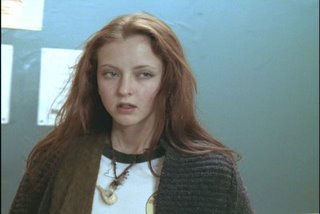
This is Ginger midway-through her startling transformation, basically at the point where she's discovering boys:
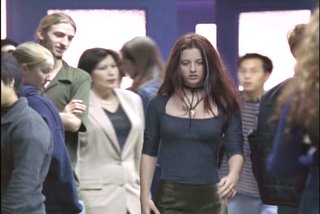
And here she is a little further along, before she basically becomes an animatronic Muppet:
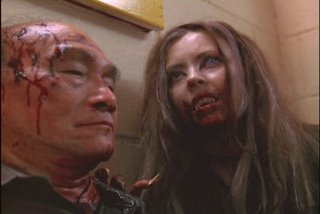
So I'm not the biggest feminist film theorist, but it seems pretty clear that Ginger's monstrousness is more destructive than it is liberating. Granted, this isn't the first time that a well-meaning Canadian director has presented borderline-misogynist images on screen, Cronenberg's Rabid and The Brood being particularly problematic examples.
Also, you can see that the movie's DVD presentation is full-frame 1.33:1, which makes comparisons with episodes of Buffy the Vampire Slayer even easier to make. A good episode, to be sure, but TV-level filmmaking nonetheless.

This is Ginger midway-through her startling transformation, basically at the point where she's discovering boys:

And here she is a little further along, before she basically becomes an animatronic Muppet:

So I'm not the biggest feminist film theorist, but it seems pretty clear that Ginger's monstrousness is more destructive than it is liberating. Granted, this isn't the first time that a well-meaning Canadian director has presented borderline-misogynist images on screen, Cronenberg's Rabid and The Brood being particularly problematic examples.
Also, you can see that the movie's DVD presentation is full-frame 1.33:1, which makes comparisons with episodes of Buffy the Vampire Slayer even easier to make. A good episode, to be sure, but TV-level filmmaking nonetheless.
Sunday, June 04, 2006
Army of Shadows (1969)

Very good movie from director Jean-Pierre Melville. Usually movies set around the French Resistance in WWII feature plots to sabotage the Nazis. This one is vastly more existential and could take place in any era where a small group of people are fighting an underground war against an all-powerful government. This movie is about what it's like to constantly be looking over your shoulder, fleeing, eliminating traitors and other threats to the group's existence, knowing that your death is inevitable. Probably not particularly well-received in France when it was made.
Also, one of the grayest movies I've ever seen; this movie has virtually no color at all, and every scene is basically some variant of blue or gray.
The Omen (1976)

Considered to be a classic, although it's not really very good. For one thing, there's no surprise about what's going on; you already know that Damien's not quite right from the opening titles. Gregory Peck does a strong job as the anguished father, and there are some good, lavishly rendered death sequences, but these two features feel like they don't belong in the same movie as each other. Doesn't Richard Donner know that if you're going to decapitate someone from three different camera angles, the movie as a whole shouldn't take itself too seriously?
Hell's Kitchen
I saw a single episode of this reality show on Friday. Typical stuff: manipulative editing, obnoxious star character (who only exists to scream obscenities to the other characters), moderately interesting 'goals' for the different teams competing. As annoying as it was, I could see why it would be addictive to the casual viewer.
Subscribe to:
Posts (Atom)
